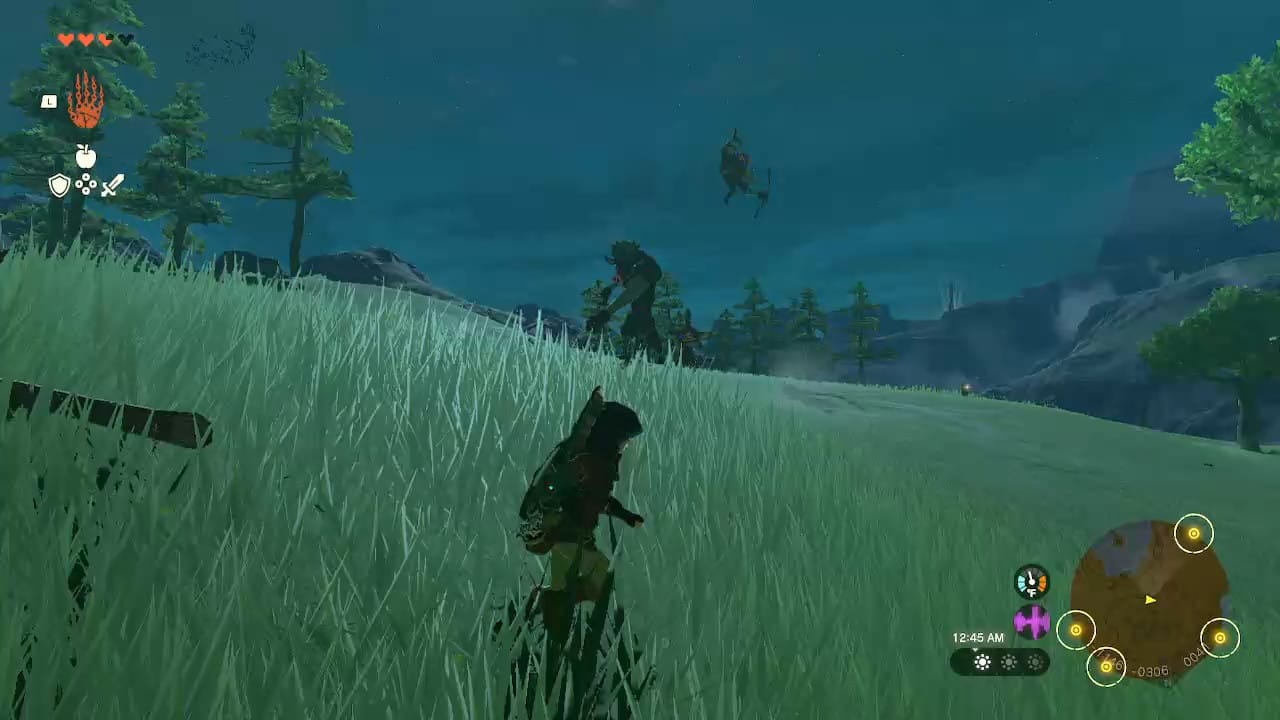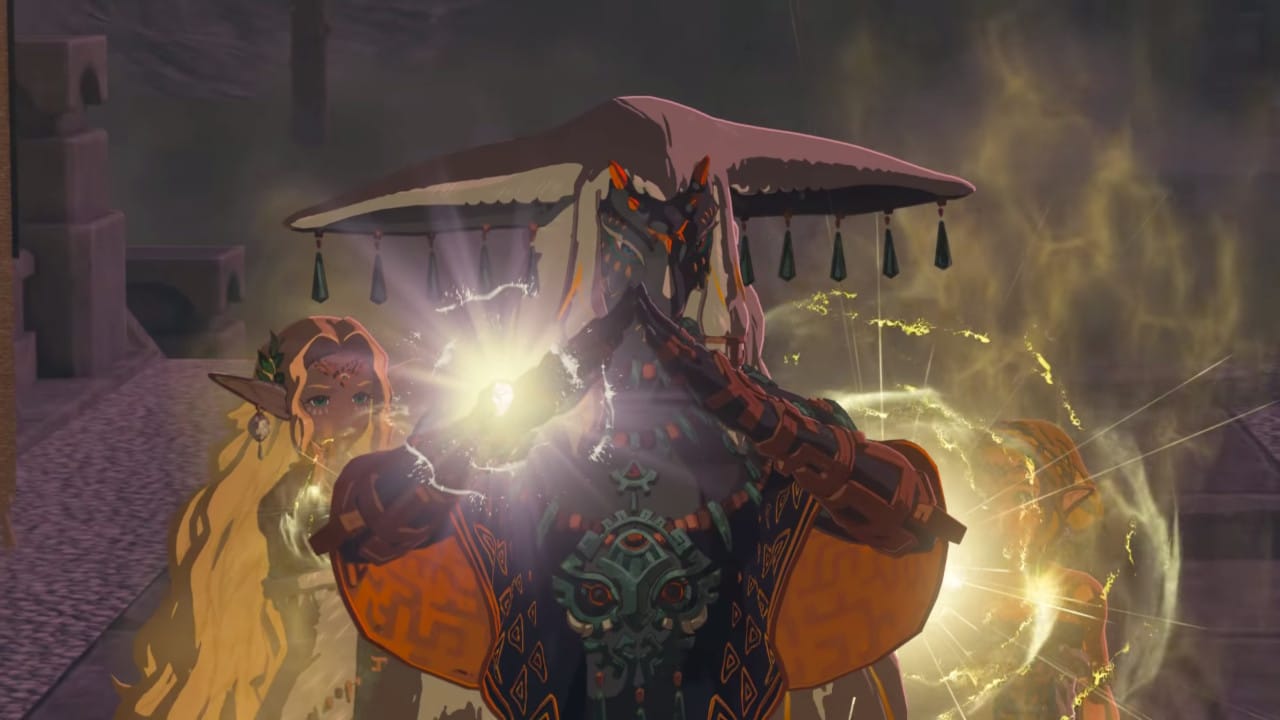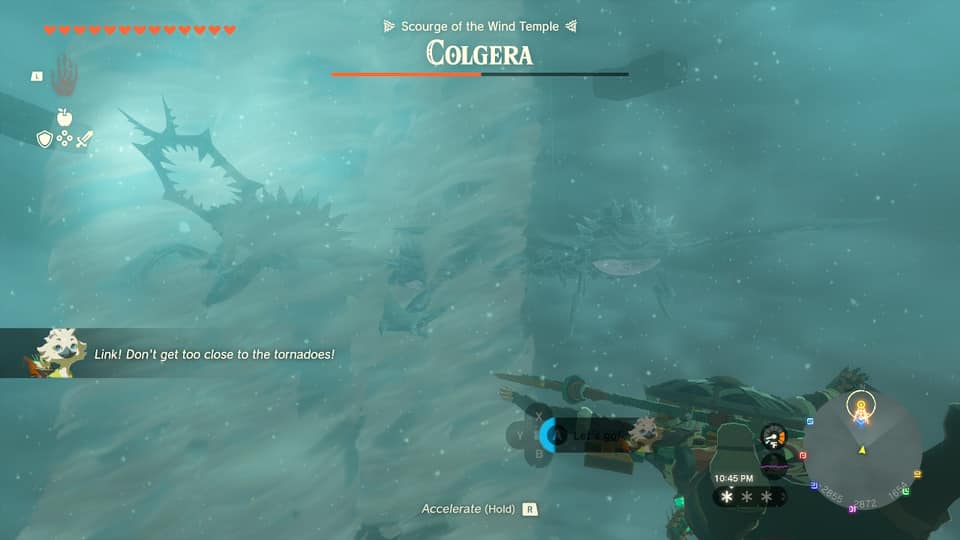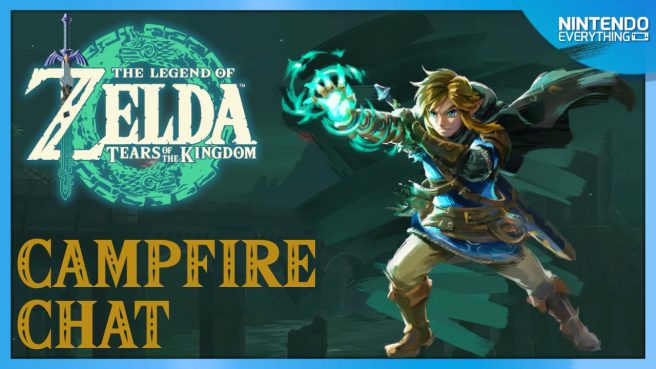A campfire chat about The Legend of Zelda: Tears of the Kingdom
With over a month under our belts exploring the expanded and more populous Hyrule, Tears of the Kingdom has had time to settle in as the newest title in the Legend of Zelda series. A direct sequel to Breath of the Wild, players will find maps to be vastly changed, even if a bit familiar. As one of the most-anticipated games of 2023, the team here at Nintendo Everything ended up picking up copies across the board – and for the first time, we’d all like to weigh in with our impressions and takeaways when it comes to Link’s latest adventure since we’ve had a few weeks to digest it all. Members of the team came together and discussed our experiences with Tears of the Kingdom, and you can see our various takes on the game below.
Dennis Gagliardott0 – @LyonHart_
Breath of the Wild did things to video games that transcended everything we knew what could be possible at the time. Sure, we’ve had open-world games before – and even the art direction wasn’t entirely new due to cel-shaded tech that’s been around for ages now – but it’s the way Zelda transformed its entire structure while still maintaining its core DNA that breathed new life into a series that didn’t even need to be revitalized to begin with. The Legend of Zelda series has and always will be wildly successful – it’s an evergreen property that is rooted into not only the medium of video games but pop culture – but Breath of the Wild’s influence was felt on such a massive scale thanks to not only its mechanics but how it felt.
There are certain games, movies, and books that you just know are going to be special upon laying eyes on them. I think of works such as Your Name, Gris, Journey, Violet Evergarden, and more that have this aura about them you can’t help but gravitate towards, and Breath of the Wild felt the same way before and after its release. It’s a game that felt necessary to the medium and done in a way that only Zelda could capitalize on, and we’ve since then seen many take influence upon its format no different from what Stardew Valley did for farming simulators, World of Warcraft did for MMOs, Fortnite did for battle royales, and what Vampire Survivors is doing now for bullet hell titles.
All Tears of the Kingdom really needed to do was find a way to create the exceptional experience of Breath of the Wild one more time, and though it took many years for it to happen, it feels surreal to play a game that has met the already high standards of its predecessor (and even exceeded it, some would argue). It’s one of those odd cases where now people will have conversations of “which masterpiece is better”, no different from the conversations still being had of “Alien or Aliens”, “Terminator or Terminator 2”, and “Godfather and Godfather Part II” decades after their theatrical debut.
For all Tears of the Kingdom does to improve and extend the formula that is housed and specialized in a way that only Zelda can achieve, however, its biggest and most advertised feature – the sky – in which the “tears” stem from due to the falling debris throughout Hyrule feels almost as if it was a way to distract rather than be of any significant value. It’s true that as I’m still making my way through Tears of the Kingdom slowly but surely as I nurse it much like I did Breath of the Wild to get as much out of it as possible is leaving me still oblivious to what the Upheaval is truly all about, I can’t help but feel like every time I’ve made my way towards the sky outside of its opening act, I’ve found myself unimpressed with some of the islands up there. What’s worse is when you reverse time on an object that’s fallen, only for it to go up and up and up until it eventually stops at nothing; It’s just a randomly spawned rock or whatever that hasn’t fallen from any sort of sky island.
Then you have the Depths, which was no doubt inspired by the world’s most famous underground location: Hell.
Tears of the Kingdom on the surface (literally and figuratively), though, is fantastic through and through. Its new mechanics such as its Fusion and Ultrahand abilities have opened up so much of the world that virtually everything in the game has purpose. You can create just about anything you can possibly think about within reason, and use such concoctions and creations in ways previously unknown. It’s an incredibly deep world that once more pulls you in and lets you play how you want to play without overdoing its restrictions. There are too many open-world games that, despite their freedom, very clearly have a virtual “shock collar” on what is and what’s not accessible depending on where a player is in their story or how far their character has advanced in level or skill, but Tears of the Kingdom never forgets the one thing that makes it so much fun that a lot of titles tend to forget about: It’s a video game. We don’t need the insane simulation or need for realism. The physics feel exactly how they should, but outside of that is a pure fantasy playground that players can get lost in.

Edan Hogan Duff – @Project_Edan
When Breath of the Wild released in 2017, I was something of a lapsed fan of the Zelda franchise. I was thoroughly hyped of course (new Nintendo hardware will do that), but I wasn’t boiling over with anticipation like some life-long fans of the series. This slightly apathetic stance allowed BoTW to become one of my favorite games of all time – I had essentially been caught with my guard down. Breath of the Wild took every core concept that the series had offered to players over thirty years, along with every bit of dreamy, fantastical iconography that had served it so well, and re-envisioned the entire package for a modern audience. The end result was a game over-flowing with purposeful, considered artistry – where every single individual element felt as though it complemented every other aspect of the game. Breath of the Wild would stand as an incredibly difficult act to iterate upon, which is why I was very surprised to see Nintendo follow it up with a direct sequel.
Let me cut to the chase – Tears of the Kingdom is a good game, and one that I have spent about 150 hours with. I’ve finished the main story, completed every shrine, found every light-root, and kitted Link out with death-dealing blueprints that put the entire Haynes back catalog to shame. I have enjoyed my time with the game, however when I think back on the experience, I do feel a note of disappointment. To me, Tears of the Kingdom lacks the cohesion that Breath of the Wild so confidently exuded – it’s almost as if the game was designed by three or four different teams that all had minimal contact with one another over the course of the game’s creation. Link’s new abilities don’t feel as seamlessly integrated into the game’s re-used map, partly owing to the sheer scope of Ultra-hand and its near-limitless crafting potential. Designing a curated set of challenges around such a free-form toolset was undoubtedly Nintendo’s biggest challenge for Tears of the Kingdom, and I can see and feel that strain within most of the game’s dungeons and shrines.
Given how reliant Tears of the Kingdom is on Breath of the Wild’s framework, it’s that much harder to assess Tears of the Kingdom on its own terms. One area where we have seen a massive improvement over Breath of the Wild is in the game’s quantity of side quests – there is a LOT to do in Tears of the Kingdom. With that said, far too often these side adventures devolve into Ubisoft-style busy-work, endlessly repeating the same set of challenges until you’re bored stiff. The way in which Ultra-hand goads you into using madcap contraptions to catapult yourself around Hyrule is also a source of friction, as you aren’t stopping to smell the roses and engage with NPCs as much as in Breath of the Wild. All of these little contradictions are littered throughout Tears of the Kingdom, and it makes the decision to set the game up as a sequel to Breath of the Wild feel like a fiscally conservative one, instead of one driven by creativity.
I could go on (where are the Divine Beasts? What happened to Link’s Master Cycle Zero? Why is a dead guy introducing me to shrines again?), but I’ll refrain from sticking the boot in any further – after all, I’ve spent over 150 hours with the game, so the jokes on me I guess! I definitely enjoyed Tears of the Kingdom and it is by no means a bad game – it just feels a little closer to being a zany mod instead of a true follow-up to its predecessor. Tears of the Kingdom isn’t a bad game, but it is a bad sequel.

Nick Serpa – @ndserpa
Tears of the Kingdom is not a game designed to be rushed through for the purposes of writing a review; it’s meant to be slowly absorbed over time, to be poked and prodded at, to be played with. It’s partially why I’ve been pacing myself, putting in a slow thirty hours or so since release. I’ve barely scratched the surface of what Tears has to offer, and I’m sure that the more time I spend with it, the more I’ll appreciate it. That said, while it’s a clear refinement of Breath of the Wild’s innovations, I find myself struggling to want to engage with Tears’ mechanics at the level that it feels like I’m meant to.
Everyone plays games for different reasons. For me, generally, I play games that aim to tell compelling stories in an immersive environment. Tears of the Kingdom nails the latter – its world feels alive, more so than any other Zelda game I’ve played. Major story beats remain further apart then I would like, but the space between those beats is filled with characters with interesting backstories, funny quips, and sometime even anxiety or fear. Encountering other travelers while you meander through a vast, dense forest feels like a discovery in of itself, as does almost every moment of exploration in general. The world feels both familiar and different, always threatening, and always like an adventure is right around the corner.
But you’ll have to make that adventure yourself in Tears of the Kingdom, though, and Hylia help you if you want anything else. While the game gives you many tools to make your own fun with, few of the tools are actually fun to use. I’m glad I can still ride my horse around Hyrule, because I have zero interest in haphazardly trying to build a vehicle or structure with green super glue – it just breaks the immersion for me when I have to stitch some janky structure together to solve an environmental puzzle. The other abilities are more interesting, but they feel less like a part of the world and more like cheat codes to let you break the game. I miss the days in which Zelda game’s puzzles and their corresponding mechanics had stronger narrative ties, like Wolf Link in Twilight Princess – here, it feels like the puzzles and abilities were designed first, and then loosely tied to the plot and world after.
There’s also the fact that every action in Tears of the Kingdom just feels like work. The size of the world, combined with the lack of direction, makes getting anywhere feel inordinately arduous, and while yes, fast travel exists, to me that’s a signal that a game needs better pacing. Once you do establish a direction, you probably aren’t strong enough or well-equipped enough to tackle whatever obstacle is over there, so you’ll need to spend time finding and completing soulless shrine puzzles, watching repetitive cooking animations, and probably trying to avoid combat altogether, lest your good weapons break. Sure, you could fuse stuff to them, assuming you have monster parts that are actually useful, which means fighting a Bokoblin camp for the 80th time, which is just going to reset at the end of the day. And you do all this for… some brief story developments that are over in a flash? I don’t know why else, because everything I just described feels more like a means to an end to me rather than mechanics designed to be fun.
Maybe I shouldn’t have expected that Tears of the Kingdom would be a more focused, tighter-paced game than Breath of the Wild, with stronger narrative direction. Maybe sandbox games just aren’t my thing anymore (although I’ve enjoyed others in the past). Maybe things will change the more I play, but from what I’ve heard from others, they don’t. Tears of the Kingdom simply isn’t a game that respects players’ time, and for me, that makes it hard to want to see the story through to the end.

Elias Nox Lutes – @FabledFirelight
I guess I should preface this with the fact that my top three favorite Legend of Zelda games are the following: A Link to the Past, Oracle of Seasons, and a A Link Between Worlds. As a huge fan of the top-down perspective approach to dungeon adventure titles, Breath of the Wild is a huge leap away from what my normal Zelda experience is like for me. While Ocarina of Time and Majora’s Mask were childhood favorites, I found myself falling off the actual hype train for new 3D Zelda experiences around the time that Twilight Princess launched, and even more so when Skyward Sword arrived on the Wii with its obligatory motion controls. While I can look at Wind Waker very fondly, Twilight Princess is just a blip in my memory when it comes to the Zelda timeline. Not a very common opinion, but the world would be boring if we all felt the same about everything. That being said, Breath of the Wild and now Tears of the Kingdom coming onto the Nintendo Switch have been an interesting new foray into the formula of what it is to be a Zelda title.
Open world sandbox games have long been a mainstay in my gaming activities – Morrowind taking over an entire summer of my childhood, Fallout titles constantly sucking me back in, and even newer games like Valheim have a draw that I just can’t pull away from. The newer Zelda entries have a lot of that same charm, and with both Switch games I’ve found myself completely averse to completing objectives in a timely manner and going for a different methodology entirely. Both times, the first thing I’ve focused on is entirely uncovering the game’s expansive map. Next, tackling Shrines to increase my hearts and Stamina – only once I’m really satisfied with my current state will I even think about going to a dungeon or Spirit Beast and truly going after the games’ respective narratives.
Tears of the Kingdom has felt like a simple expansion to Breath of the Wild for me, and I don’t see this as a negative. The addition of the fusion system, the sky islands, and even the creepy crawly depths has simply fueled my incessant need to explore and uncover new things. I did not find myself wanting for variety really, and that’s after chasing rare equipment from the rumors of treasure maps, activating every Shiekah Tower, and getting my keester handed to me by the creatures that dwell in the darkness. Sidequests have only increased my wayward meandering – leading me to not complete a single mainline quest after getting my paraglider for about 25 hours of gameplay… The real tears have been the ones of my ADHD.
As much as being on-rails is not a super attractive prospect for many players in the age where the story-free Minecraft has sold over 238 million copies, I think Tears of the Kingdom’s biggest weakness is truly the lack of pacing when it comes to actually pursuing the narrative. Where Breath of the Wild’s best story points were completely optional in the collection of memories, Tears of the Kingdom does improve on world building and overall lore with a more populous and lively Hyrule. Be that as it may, being set loose in a completely open world where my hamster brain is free to make decisions, or completely cast decision making aside in favor of collecting fusion items and creating strange vehicles and weapons with Ultra-Hand did not have a very positive impact on my overall playtime before getting close to endgame.
My overall experience with Tears of the Kingdom has definitely been a positive one. While I do pine for the old style of dungeon spelunking and linear progression, there is definitely a place and an audience for the the new formula. Maybe I’ll never see a new entry in the style of Link’s Awakening ever again, and that will leave my heart pretty cold and sad. Luckily, there are tons of games out there to scratch that specific itch, and I’m content to give those a shot, too. While I hope that the narrative aspect will improve in future Zelda titles, I was very happy to see that the mapping system for setting quests and objectives was easy to use, and that fast-travel seemed to be encouraged as a way to keep yourself on track. Until the next Zelda comes out, I’ll still be busy checking in on the towns and village folk and forging my weird explosive weapon automatons. Perhaps I’ll even try and tackle one of those computers some people have been able to string together – truly, Tears of the Kingdom has a lot to offer, and I’ll be putting hours into it for many months to come.
With the team here at Nintendo Everything putting their time and efforts into Princess-finding endeavors, we’d like to ask how Tears of the Kingdom feels for you? Leave a comment below with your own impressions. Do you also miss the old Zelda formula, or are you content with the direction that the series is taking? Still on the fence? Tell us about it.
